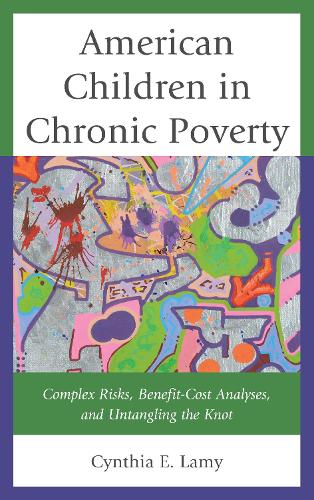
American Children in Chronic Poverty: Complex Risks, Benefit-Cost Analyses, and Untangling the Knot
(Paperback)
Publishing Details
American Children in Chronic Poverty: Complex Risks, Benefit-Cost Analyses, and Untangling the Knot
By (Author) Cynthia E. Lamy
Bloomsbury Publishing PLC
Lexington Books
12th March 2014
United States
Classifications
Professional and Scholarly
Non Fiction
Social welfare, social policy and social services
Philosophy and theory of education
Political economy
362.775690973
Physical Properties
Paperback
208
Width 156mm, Height 230mm, Spine 15mm
322g
Description
Why is it so difficult for some people to escape poverty Cynthia Esposito Lamy answers that question in American Children in Chronic Poverty: Complex Risks, Benefit-Cost Analyses, and Untangling the Knot by describing the complex and interacting knot of problems that children face as they grow up in poverty. Through a vast store of research on topics related to children, families and poverty, and methods to estimate social return on investment, Lamy determines which programs and policies produce benefits that exceed costs, providing evidence for an efficient fight against poverty.
Specific expert policy recommendations for keeping poverty from ruining childrens potential are described within three broad themes: bringing equity to our educational system, supporting families as they transition through difficulties, and making work pay. Lamy concludes with foundational concepts for building an overarching model of poverty-fighting to bring separate, narrowly defined programs and policies together. Benefit-cost analysis confirms what the great religions have been trying to tell us for millennia: when we respect and care for the most vulnerable members of our society we create a strong, successful society in which everyone prospers.
Reviews
Over the last half century, a strong understanding of the pernicious influence of childhood poverty has been developed. Lamy explains how to intervene to mitigate the effects of impoverishment. "To keep poverty from ruining a child's potential is to free a child from poverty. To accomplish that on a broad scale is to end poverty as we know it." Certainly, the need is very real: 20 percent of children in the US live in poverty, and these children face much greater physical and psychological risks than other children do. The evidence on what works is also clear. For children born into poverty, good parenting is essential. "Starting in infancy, a warm, caring and consistent parental relationship allows a child to build a foundation for the interpersonal skills he needs to succeed in the world." Subsequent investments in high-quality early education and strong K-12 education lead to favorable outcomes. Implementing strong, evidence-based interventions that reduce the effects of childhood poverty is smart public policy. The evidence is clear that communities realize strong returns when they make smart investments in their youngest children. Summing Up: Recommended. All readership levels. * Choice Reviews *
It is time as a nation that we dedicated more attention to the problems of the poor and the ways in which we can effectively alleviate them. Lamy should be commended for tackling such a large and complex issue, and for doing so objectively and thoughtfully. -- Phillip B. Levine, Wellesley College
Few problems have been as resistant to policy 'cures' as child poverty in the United States. Cynthia Esposito Lamy explains why. Her passionate plea for a new policy prescription based on the cold logic of cost-benefit analysis is a must read for anyone in government or philanthropy working to end child poverty. -- W. Steven Barnett, Rutgers University
Author Bio
Cynthia E. Lamy is senior fellow at the National Institute for Early Education Research at Rutgers University and Metrics Manager at the Robin Hood Foundation.
